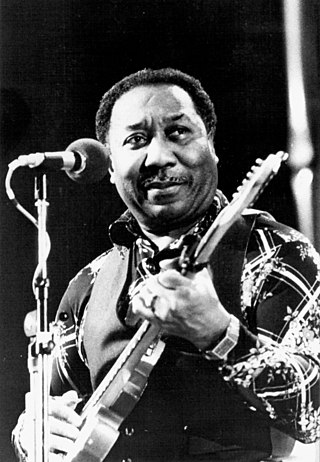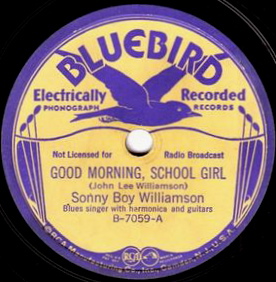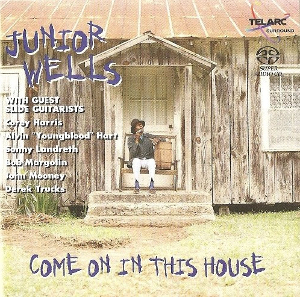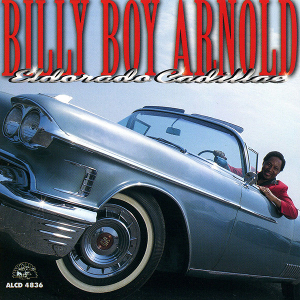
McKinley Morganfield, known professionally as Muddy Waters, was an American blues singer and musician who was an important figure in the post-World War II blues scene, and is often cited as the "father of modern Chicago blues". His style of playing has been described as "raining down Delta beatitude".
Chicago blues is a form of blues music that developed in Chicago, Illinois. It is based on earlier blues idioms, such as Delta blues, but is performed in an urban style. It developed alongside the Great Migration of African Americans of the first half of the twentieth century. Key features that distinguish Chicago blues from the earlier traditions, such as Delta blues, is the prominent use of electrified instruments, especially the electric guitar, and especially the use of electronic effects such as distortion and overdrive.

John Lee Curtis "Sonny Boy" Williamson was an American blues harmonica player, singer and songwriter. He is often regarded as the pioneer of the blues harp as a solo instrument. He played on hundreds of recordings by many pre–World War II blues artists. Under his own name, he was one of the most recorded blues musicians of the 1930s and 1940s and is closely associated with Chicago producer Lester Melrose and Bluebird Records. His popular songs, original or adapted, include "Good Morning, School Girl", "Sugar Mama", "Early in the Morning", and "Stop Breaking Down".

Earl Zebedee Hooker was a Chicago blues guitarist known for his slide guitar playing. Considered a "musician's musician", he performed with blues artists such as Sonny Boy Williamson II, Junior Wells, and John Lee Hooker and fronted his own bands. An early player of the electric guitar, Hooker was influenced by the modern urban styles of T-Bone Walker and Robert Nighthawk. He recorded several singles and albums as a bandleader and with other well-known artists. His "Blue Guitar", a slide guitar instrumental single, was popular in the Chicago area and was later overdubbed with vocals by Muddy Waters as "You Shook Me".

Homesick James was an American blues musician known for his mastery of the slide guitar. He worked with his cousin, Elmore James, and with Sonny Boy Williamson II.

William "Big Bill" Morganfield is an American blues singer and guitarist, who is the son of McKinley Morganfield, also known as Muddy Waters.

Willie Lee "Big Eyes" Smith was an American electric blues vocalist, harmonica player, and drummer. He was best known for several stints with the Muddy Waters band beginning in the early 1960s.

"Good Morning, School Girl" is a blues standard that has been identified as an influential part of the blues canon. Pre-war Chicago blues vocalist and harmonica pioneer John Lee "Sonny Boy" Williamson first recorded it in 1937. Subsequently, a variety of artists have recorded versions of the song, usually calling it "Good Morning Little Schoolgirl".

Muddy "Mississippi" Waters – Live is a live album by Muddy Waters, released in January 1979. It was recorded during the 1977–78 tour to support Muddy Waters' album Hard Again (1977) and features the same musicians, including James Cotton and Johnny Winter, who had produced the album.

Fathers and Sons is the seventh studio album by the American blues musician Muddy Waters, released as a double LP by Chess Records in August 1969.
"Early in the Morning" is a blues song that was recorded by Sonny Boy Williamson I in 1937. Identified as one of his most successful and influential tunes, it was inspired by earlier blues songs. "Early in the Morning" has been recorded by various musicians, including Junior Wells, who made it part of his repertoire.
Johnny "Big Moose" Walker was an American Chicago blues and electric blues pianist and organist. He worked with many blues musicians, including Ike Turner, Sonny Boy Williamson II, Lowell Fulson, Choker Campbell, Elmore James, Earl Hooker, Muddy Waters, Otis Spann, Sunnyland Slim, Jimmy Dawkins and Son Seals.

Muddy Waters Sings "Big Bill" is the first studio album, but second overall album by blues musician Muddy Waters, featuring songs by Big Bill Broonzy, released by the Chess label in 1960.

Live at Mister Kelly's, often stylized as "Live" , is a live album by blues musician Muddy Waters released by the Chess label in 1971.

Come On in This House is an album by the American musician Junior Wells. Released in 1996, it was Wells's final studio album. He supported it with a North American tour.

Eldorado Cadillac is an album by the American musician Billy Boy Arnold, released in 1995. It was the second album of his 1990s comeback. Arnold considered his two Alligator Records albums to be the best of his career. The album won a National Association of Independent Record Distributors award for best blues album.

Fine and Mellow is an album by the American musician Ruth Brown, released in 1991. After recuperating from leg surgery, Brown supported the album with several concert appearances.

That's When I Know is an album by the American musician Eddie C. Campbell, released in 1994. It marked Campbell's return to the United States after spending more than a decade in Europe. Campbell supported the album with a North American tour. The title track was nominated for a W. C. Handy Award.

Deep in the Blues is an album by the American musician James Cotton, released in 1996. It peaked at No. 13 on Billboard's Blues Albums chart. Deep in the Blues won a Grammy Award for "Best Traditional Blues Album". It also won a W. C. Handy Award for best "Acoustic Blues Album". Cotton supported the album with a North American tour.
















